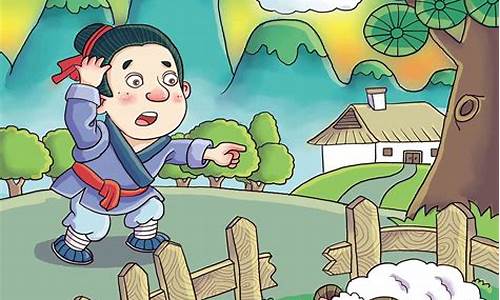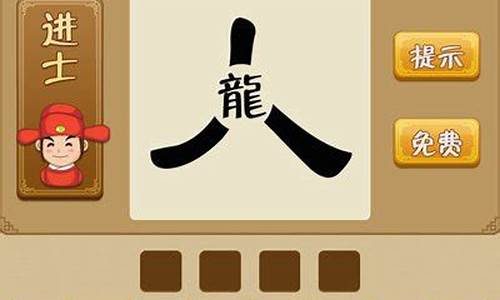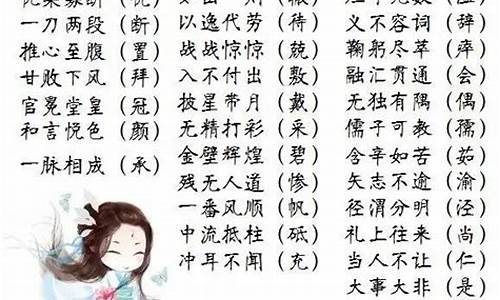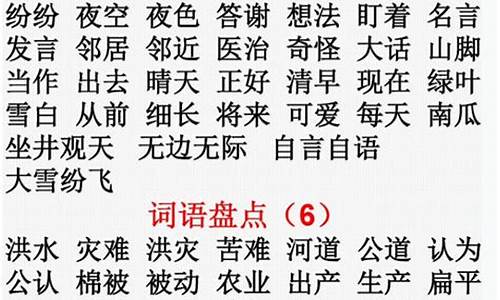您现在的位置是: 首页 > 成语解释大全 成语解释大全
成语故事英文版_成语故事英文版简短
ysladmin 2024-05-15 人已围观
简介成语故事英文版_成语故事英文版简短 感谢大家参与这个关于成语故事英文版的问题集合。作为一个对此领域有一定了解的人,我将以客观和全面的方式回答每个问题,并分享一些相关的研究成果和学术观点。1.少儿英语成语故事:自相矛盾2.寻 成语故事英文翻译3.
感谢大家参与这个关于成语故事英文版的问题集合。作为一个对此领域有一定了解的人,我将以客观和全面的方式回答每个问题,并分享一些相关的研究成果和学术观点。
1.少儿英语成语故事:自相矛盾
2.寻 成语故事英文翻译
3.少儿英语成语故事:毛遂自荐
4.英语成语故事 要短一点的 四年级水平 不许抄别人的 包括百度里的
5.求成语故事的英语翻译
6.揠苗助长(英文版故事)
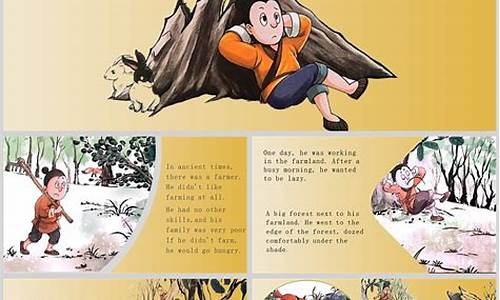
少儿英语成语故事:自相矛盾
A man of the state of Chu had a spear and a shield for sale. He was loud in praises of his shield.
“My shield is so strong that nothing can pierce it through.”He also sang praises of his spear.“My spear is so strong that it can pierce through anything.”“What would happen,” he was asked, “if your spear is used to pierce your shield?”It is impossible for an impenetrable shield to coexist with a spear that finds nothing impenetrable.
这个成语出自《韩非子·难一》。
古时候,矛和盾都是作战用的武器。矛用来刺杀敌人,盾则用来保护身体,以免被对方的矛刺中。
传说很久以前,楚国有个卖兵器的人,在市场上卖矛和盾。为了让人家愿意买他的货,他先举起盾向人们夸口道:“你们看,我的盾是世上最坚固的盾,任何锋利的东西都不能刺穿它。”接着又举起他的矛,向人吹嘘说:“你们再看看我的矛,它锋利无比,无坚不摧,无论多么坚硬的盾,都挡不住它,一刺就穿!”
围观的人听了他的话都觉得很好笑,人群中有人问道:“依你的说法,你的矛无论怎样坚硬的盾都能刺穿,而你的盾又是无论多么锋利的矛也不能把它刺穿。那就拿你的矛来刺你的盾吧,看看结果怎么样?”
卖兵器的人听了张口结舌,无从回答,只好拿着矛和盾走了。
“自相矛盾”就是由这个故事演变而来的。现在人们用它来比喻做事、说话前后自相抵触。
寻 成语故事英文翻译
英语成语故事-井底之蛙
The Frog in the Shallow Well (Jing Di Zhi Wa)
Have you not heard of the frog that lived in a shallow well? It said to a turtle that lived in the East Sea, "I am so happy! When I go out, I jump about on the railing beside the mouth of the well. When I come home, I rest in the holes on the broken wall of the well. If I jump into the water, it comes up to my armpits and holds up my cheeks. If I walk in the mud, it covers up my feet. I look around at the wriggly worms, crabs and tadpoles, and none of them can compare with me. Moreover, I am lord of this trough of water and I stand up tall in this shallow well. My happiness is full. My dear sir, why don't you come often and look around my place?"
Before the turtle from the East Sea could get its left foot in the well, its right knee got stuck. It hesitated and retreated. The turtle told the frog about the East Sea.
"Even a distance of a thousand li cannot give you an idea of the sea's width; even a height of a thousand ren cannot give you an idea of its depth. In the time of King Yu of the Xia dynasty, there were floods nine years out of ten, but the waters in the sea did not increase. ln the time of King Tang of the Shang dynasty there were droughts seven years out of eight, but the waters in the sea did not decrease. The sea does not change along with the passage of time and its level does not rise or fall according to the amount of rain that falls. The greatest happiness is to live in the East Sea."
After listening to these words, the frog of the shallow well was shocked into realization of his own insignificance and became very ill at ease.
=============================
英语故事:惊弓之鸟
A Bird Startled by the Mere Twang of a Bow-String
This set phrase figuratively denotes those who have suffered disasters and so have a lingering fear when anything happen.
During the War Period ,in the Wèi State there lived a famous archer named Gēng léi.
One day,Gēng léi and the King of Wei standing on a high terrace saw some birds flying past.
At this Gēng léi said to the King:"I'll shoot a flying bird down for YourMajesty by drawing a bow with no arrow."
The King asked,"Is it possible that one's archery can attain such a level?"
A little later,a wild goose was flying from the east.
Gēng léi just drew his bow but didn't shoot an arrow.
As expected,the wild goose fell to the ground with the twang.
The King asked in surprise,"How can your archery reach such a high level?"
Gēng léi replied ,"This wild goose has been wounded."
The King got more surprised,asking,"How do you know it,sir?"
Gēng léi esplained,"This wild goose flew slowly and cried sadly.Its flying slowly suggested that it was still aching with the old wound; its crying sadly suggested that it had strayed long from its flock.When it heard the twang the wild goose had to flutter hard to fly high for its life.So it is evitably fell down with its old wound burst."
=============================
刻舟求剑
Making His Mark (Ke Zhou Qiu Jian)
A man from the state of Chu was crossing a river. In the boat, his sword fell into the water. Immediately he made a mark on the boat.
"This is where my sword fell off," he said.
When the boat stopped moving, he went into the water to look for his sword at the place where he had marked the boat.
The boat had moved but the sword had not. Is this not a very foolish way to look for a sword?
A man from the State Chu was crossing the river. In the boat, his sword fell
into the water by his carelessness. Imediately he made a mark on the boat.“This
is where my sword fell off.”He said. When the boat stopped, he jumped into the
water to look for his sword at the place where he marked the boat. The boat had
moved but the sword had not. Is this not a foolish way to look for a sword?
刻舟求剑
少儿英语成语故事:毛遂自荐
笨鸟先飞A slow sparrow should make an early start.
不眠之夜white night
不遗余力spare no effort; go all out; do one"s best
不打不成交"No discord, no concord.
拆东墙补西墙rob Peter to pay Paul
大开眼界open one"s eyes; broaden one"s horizon; be an eye-opener
国泰民安The country flourishes and people live in peace
功夫不负有心人Everything comes to him who waits.
好了伤疤忘了疼once on shore, one prays no more
和气生财Harmony brings wealth
活到老,学到老One is never too old to learn.
既往不咎let bygones be bygones
金无足赤,人无完人Gold can"t be pure and man can"t be perfect.
金玉满堂Treasures fill the home
脚踏实地be down-to-earth
脚踩两只船sit on the fence
老生常谈,陈词滥调cut and dried, cliché
礼尚往来Courtesy calls for reciprocity.
留得青山在,不怕没柴烧"Where there is life, there is hope."
马到成功achieve immediate victory; win instant success
名利双收gain in both fame and wealth
茅塞顿开be suddenly enlightened
弄巧成拙be too smart by half; Cunning outwits itself.
拿手好戏masterpiece
赔了夫人又折兵throw good money after bad
抢得先机take the preemptive opportunities
强强联手win-win co-operation
瑞雪兆丰年A timely snow promises a good harvest.
人之初,性本善Man"s nature at birth is good.
人逢喜事精神爽Joy puts heart into a man.
人海战术huge-crowd strategy
世上无难事,只要肯攀登"Where there is a will, there is a way. "
世外桃源a fictitious land of peace away from the turmoil of the world;
死而后已until my heart stops beating
岁岁平安Peace all year round
塞翁失马,焉知非福Misfortune may be an actual blessing.
升级换代updating and upgrading (of products)
四十不惑Life begins at forty.
水涨船高When the river rises, the boat floats high.
时不我待Time and tide wait for no man.
杀鸡用牛刀break a butterfly on the wheel
说曹操,曹操到Talk of the devil and he comes.
实话实说speak the plain truth; call a spade a spade; tell it as it is
实践是检验真理的唯一标准Practice is the sole criterion for testing truth.
糖衣炮弹sugar-coated bullets
天有不测风云Anything unexpected may happen. a bolt from the blue
团结就是力量Unity is strength.
歪风邪气unhealthy practices and evil phenomena
物以类聚,人以群分Birds of a feather flock together.
望子成龙hold high hopes for one"s child
屋漏又逢连阴雨Misfortunes never come singly. When it rains it pours.
文韬武略military expertise; military strategy
唯利是图draw water to one"s mill
无源之水,无本之木water without a source, and a tree wiithout roots
无中生有make/create something out of nothing
徇私枉法bend the law for the benefit of relatives or friends
新官上任三把火a new broom sweeps clean
蓄势而发accumulate strength for a take-off
心想事成May all your wish come true
先入为主First impressions are firmly entrenched.
先下手为强catch the ball before the bound
像热锅上的蚂蚁like an ant on a hot pan
现身说法warn people by taking oneself as an example
息事宁人pour oil on troubled waters
喜忧参半mingled hope and fear
循序渐进step by step
鱼米之乡a land of milk and honey
有情人终成眷属"Jack shall have Jill, all shall be well."
有钱能使鬼推磨Money makes the mare go. Money talks.
有识之士people of vision
有勇无谋use brawn rather than brain
与时俱进advance with times
以人为本people oriented; people foremost
因材施教teach students according to their aptitude
欲速则不达Haste does not bring success.
优胜劣汰survival of the fittest
英雄所见略同Great minds think alike.
冤家宜解不宜结Better make friends than make enemies.
一言既出,驷马难追A real man never goes back on his words.
招财进宝Money and treasures will be plentiful
债台高筑become debt-ridden
致命要害Achilles" heel
众矢之的target of public criticism
纸上谈兵be an armchair strategist
纸包不住火Truth will come to light sooner or later.
英语成语故事 要短一点的 四年级水平 不许抄别人的 包括百度里的
volunteer to do sth/recommend oneself毛遂自荐
In the Warring States Period, the State of Qin besieged the capital of the State of Zhao.战国时代,秦国军队攻打赵国的都城。
Duke Pingyuan of Zhao planned to ask the ruler of the State of Chu personally for assistance.He wanted to select a capable man to go with him. 赵国的平原君打算亲自到楚国去请救兵,想挑选一个精明能干的人一同前去。
A man called Mao Sui volunteered. 有一个名叫毛遂的人,自告奋勇愿意同去。
When the negotiactions between the two states were stalled because the ruler of Chu hesitated to send troops, Mao Sui approached him, brandishing a sword. At that, the ruler of Chu agreed to help Zhao, against Qin.平原君到楚国后,与楚王谈了半天,没有一点结果。毛遂怒气冲冲地拿着宝剑,逼近楚王,终于迫使楚王答应出兵,与赵国联合共同抵抗秦国。
This idiom means to recommend oneself.“毛遂自荐”这个成语用来比喻自己推荐自己,不必别人介绍。
文化链接
英文中“毛遂自荐”可以说成“volunteer to do sth”,“volunteer”既可以作名词,也可以作动词,作名词时的意思是“志愿者”,作动词就可以解释为“志愿去做什么事”,就是“毛遂自荐”啦~
我们来一起看几个例句吧~
Our company volunteered to support and help the victims. 我们的公司毛遂自荐来帮助受灾灾民。
You can volunteer to work one or multiple shifts。你可以毛遂自荐做单班制,也可以选择多班制。
求成语故事的英语翻译
螳螂捕蝉,惊弓之鸟,毛遂自荐,东施效颦,亡羊补牢,掩耳盗铃,画蛇添足,后来居上,南辕北辙,唇亡齿寒,三顾茅庐,黔驴技穷,揠苗助长,滥竽充数,叶公好龙,画龙点睛,画蛇添足,买椟还珠,狐假虎威,走马观花,过河拆桥,愚公移山,害群之马,负荆请罪画蛇添足 掩耳盗铃 亡羊补牢 买椟还珠 守株待兔
揠苗助长(英文版故事)
英语成语故事-井底之蛙
The Frog in the Shallow Well (Jing Di Zhi Wa)
Have you not heard of the frog that lived in a shallow well? It said to a turtle that lived in the East Sea, "I am so happy! When I go out, I jump about on the railing beside the mouth of the well. When I come home, I rest in the holes on the broken wall of the well. If I jump into the water, it comes up to my armpits and holds up my cheeks. If I walk in the mud, it covers up my feet. I look around at the wriggly worms, crabs and tadpoles, and none of them can compare with me. Moreover, I am lord of this trough of water and I stand up tall in this shallow well. My happiness is full. My dear sir, why don't you come often and look around my place?"
Before the turtle from the East Sea could get its left foot in the well, its right knee got stuck. It hesitated and retreated. The turtle told the frog about the East Sea.
"Even a distance of a thousand li cannot give you an idea of the sea's width; even a height of a thousand ren cannot give you an idea of its depth. In the time of King Yu of the Xia dynasty, there were floods nine years out of ten, but the waters in the sea did not increase. ln the time of King Tang of the Shang dynasty there were droughts seven years out of eight, but the waters in the sea did not decrease. The sea does not change along with the passage of time and its level does not rise or fall according to the amount of rain that falls. The greatest happiness is to live in the East Sea."
After listening to these words, the frog of the shallow well was shocked into realization of his own insignificance and became very ill at ease.
=============================
英语故事:惊弓之鸟
A Bird Startled by the Mere Twang of a Bow-String
This set phrase figuratively denotes those who have suffered disasters and so have a lingering fear when anything happen.
During the War Period ,in the Wèi State there lived a famous archer named Gēng léi.
One day,Gēng léi and the King of Wei standing on a high terrace saw some birds flying past.
At this Gēng léi said to the King:"I'll shoot a flying bird down for YourMajesty by drawing a bow with no arrow."
The King asked,"Is it possible that one's archery can attain such a level?"
A little later,a wild goose was flying from the east.
Gēng léi just drew his bow but didn't shoot an arrow.
As expected,the wild goose fell to the ground with the twang.
The King asked in surprise,"How can your archery reach such a high level?"
Gēng léi replied ,"This wild goose has been wounded."
The King got more surprised,asking,"How do you know it,sir?"
Gēng léi esplained,"This wild goose flew slowly and cried sadly.Its flying slowly suggested that it was still aching with the old wound; its crying sadly suggested that it had strayed long from its flock.When it heard the twang the wild goose had to flutter hard to fly high for its life.So it is evitably fell down with its old wound burst."
=============================
刻舟求剑
Making His Mark (Ke Zhou Qiu Jian)
A man from the state of Chu was crossing a river. In the boat, his sword fell into the water. Immediately he made a mark on the boat.
"This is where my sword fell off," he said.
When the boat stopped moving, he went into the water to look for his sword at the place where he had marked the boat.
The boat had moved but the sword had not. Is this not a very foolish way to look for a sword
谁有英语汉代成语故事?
揠苗助长(英文版故事)
揠苗助长(To Pull up the Seedlings to Help Them Grow)
Once upon a time, an old farmer planted a plot of rice. Everyday he went to the field to watch the seedlings grow. He saw the young shoots break through the soil and grow taller each day. But still, he thought they were growing too slowly. He got impatient with the young plants. "How could the plants grow faster?" He tossed in bed during the night and could not sleep. Suddenly he hit upon an idea. He had an idea not wait for daybreak. He jumped out of the bed and dashed to the field. By the moonlight, he began working on the rice seedlings. One by one, he pulled up the young plants by half an inch. When he finished pulling, it was already morning. Straightening his back, he said to himself, "What a wonderful idea! Look, how much taller the plants have grown one night!" With great satisfaction, he went back home. He told his son what he had done in a triumphant tone. His son was shocked. Now the sun had risen. The young man was heart-broken to see all the pulled-up young plants dying.
People now use " Ba Miao Zhu Zhang" to describe the behavior of those who are too eager to get something done only to make it worse. The idiom is a bit like the English proverb "Haste makes waste" ------to spoil things by excessive enthusia *** .
异译
古时候宋国有个农夫,种了稻苗后,便希望能早早收成。
每天他到稻田时,发觉那些稻苗长得非常慢。他等得不耐烦,心想:"怎么样才能使稻苗长得高,长很快呢?想了又想,他终了想到一个"最佳方法",就是将稻苗拨高几分。
经过一番辛劳后,他满意地扛锄头回家休息。然后回去对家里的人表白:"今天可把我累坏了,我帮助庄稼苗长高一大截!"
他儿子赶快跑到地里去一看,禾苗全都枯死了。
人们现在用拔苗助长形容急于求成,违法客观规律,只会把事情办坏。成语有点像西方的谚语“欲速则不达”——过度的热情只会把事情办坏
“揠苗助长”的故事形成于A
成语故事·揠苗助长
[zww./CGZ]
来源:湖北少年儿童出版社 2004-12-7 10:15:45
--------------------------------------------------------------------------------
揠(yà)这个成语出自《孟子·公孙丑上》。
春秋时期,宋国有一个农夫,他总是嫌田里的庄稼长得太慢,今天去瞧瞧,明天去看看,觉得禾苗好像总没有长高。他心想:有什么办法能使它们长得高些快些呢?
有一天,他来到田里,把禾苗一棵一棵地往上拔。一大片禾苗,一棵一棵地拔真费了不少的力气,等他拔完了禾苗,已经累得筋疲力尽了,可是他心里却很高兴。回到家里还夸口说:“今天可把我累坏了,我帮助禾苗长高了好几寸!”他儿子听了,赶忙跑到田里去看,发现田里的禾苗全都已经枯死了。
“揠苗助长”用来比喻不管事物的发展规律,急于求成,反而把事情弄糟。“揠苗助长”也可写作“拔苗助长”。
《孟子·公孙丑上》:“宋人有闵其苗之不长而揠之者,茫茫然归,谓其人曰:‘今日病矣,予助苗长矣。’其子趋而往视之,苗则槁矣。”所以选a战国
揠苗助长
成语-揠苗助长
发 音yà miáo zhù zhǎng
释 义揠:拔起。把苗拔起,以助其生长。后用来比喻违反事物的发展规律,急于求成,反而坏事。
出 处先秦·孟轲《孟子·公孙丑上》:“宋人有闵其苗之不长而揠之者,芒芒然归,谓其人曰:'今日病矣,予助苗长矣。'其子趋而往视之,苗则槁矣。”
近义词 拔苗助长、欲速不达
用 法 连动式;作主语、宾语;含贬义
示 例 对学生的教育既不能~,也不能放任自流。
典 故
古时候宋国有个农夫,种了稻苗后,便希望能早早收成。
每天他到稻田时,发觉那些稻苗长得非常慢。他等得不耐烦,心想:"怎么样才能使稻苗长得高,长很快呢?想了又想,他终了想到一个"最佳方法",就是将稻苗拨高几分。
经过一番辛劳后,他满意地扛锄头回家休息。然后回去对家里的人表白:"今天可把我累坏了,我帮助庄稼苗长高一大截!
他儿子赶快跑到地里去一看,禾苗全都枯死了。
寓意客观事物的发展自有它的规律,纯靠良好的愿望和热情够的,很可能效果还会与主观愿望相反。这一寓言还告知一具体道理:"欲速则不达"。
原文:
宋人有闵其苗之不长而揠之者,芒芒然归,谓其人曰:“今日病矣!予助苗长矣!”其子趋而往视之,苗则槁矣。天下之不助苗长者寡矣。以为无益而舍之者,不耘苗者也;助之长者,揠苗者也,非徒无益,而又害之。(闵 通:悯)
B
任何事物都必须遵循客观规律,否则必将受到惩罚。
有些家长望子成龙,在周末送孩子上各种各样的补习班,使孩子疲惫不堪。
寓言故事:自相矛盾,滥竽充数,画龙点睛,守株待兔,买椟还珠,刻舟求剑,郑人买履,黔驴技穷,亡羊补牢
揠苗助长 作文揠苗助长
1. 成语-揠苗助长
发 音yà miáo zhù zhǎng
释 义揠:拔起。把苗拔起,以助其生长。
后用来比喻违反事物的发展规律,急于求成,反而坏事。
出 处先秦·孟轲《孟子·公孙丑上》
内容宋人有闵其苗之不长而揠之者,芒芒然归,谓其人曰:“今日病矣,予助苗长矣!”其子趋而往视之,苗则槁矣。
天下之不助苗长者寡矣!以为无益而舍之者,不耘苗者也;助之长者,揠苗者也;非徒无益,而又害之。
(译文)古时候宋国有个人,嫌禾苗长得太慢,就一棵棵的往上拔起一点,回家还夸口说:“今天我帮助苗长了!”他儿子听说后,到地里一看,苗都死了。天下不助苗生长的人实在很少啊。以为没有用处而放弃的人,就像是不给禾苗锄草的懒汉。妄自帮助它生长的,就像拔苗助长的人,非但没有好处,反而危害了它。
揠苗助长原文本文言文选自《孟子·公孙丑上》 发音yà miáo zhù zhǎng释义揠:拔起。把苗拔起,帮助其生长,后用来比喻违反事物的发展规律,急于求成,反而坏事。 寓意 1、客观事物的发展自有它的规律,纯靠良好的愿望和热情是不够的,很可能效果还会与主观愿望相反。这一寓言还告知一具体道理:"欲速则不达"。 2、人们对于一切事物都必须按照客观规律去发挥自己的主观能动性,才能把事情做好。反之,单凭自己的主观愿望去做,即使有善良的愿望,美好的动机,结果也只能是适得其反。 出处先秦·孟轲《孟子·公孙丑上》 宋人有闵①其苗之不长②而揠③之者,芒芒然归④,谓其人⑤曰:“今日病⑥矣,予⑦助苗长矣!”其子趋⑧而⑨往视之,苗则槁⑩矣。 天下之不助苗长者寡矣!以为无益而舍之者,不耘苗⑾者也;助之长者,揠苗者也;非徒⑿无(13)益,而又害之。(选自《孟子·公孙丑上》) [注释] ⑴闵(mǐn)——同“悯”,担心,忧虑。 ⑵长(zhǎng)——生长,成长。 ⑶揠(yà)——拔。 ⑷芒芒然——疲倦的样子。 ⑸其人——他家里的人。 ⑹病——精疲力尽,是引申义 ⑺予——我,第一人称代词. ⑻趋——快走。 ⑼往——去,到..去。 ⑽槁(gǎo)——草木干枯。 ⑾耘苗:给苗锄草 ⑿非徒——非但。徒,只是。 ⒀益:好处。 ⒁子:儿子 译文古宋国有个人担忧他的禾苗不长就一棵一棵的拔禾苗一天下来十分疲劳,回到家对他的家人说:“今天可把我累坏了,我总算让禾苗一下子就长高了!”他儿子听说后急忙到地里去看苗,然而苗都枯萎了。 天下不犯这种拔苗助长错误的人实在很少啊!以为没有用处而放弃的人,就像是不给禾苗锄草的懒汉。妄自帮助它生长的,就像拔苗助长的人,非但没有好处,反而害了它。先秦·孟轲《孟子·公孙丑上》
宋人有闵①其苗之不长②而揠③之者,芒芒然归④,谓其人⑤曰:“今日病⑥矣,予⑦助苗长矣!”其子趋⑧而⑨往视之,苗则槁⑩矣。
天下之不助苗长者寡矣!以为无益而舍之者,不耘苗⑾者也;助之长者,揠苗者也;非徒⑿无(13)益,而又害之。(选自《孟子·公孙丑上》)
[注释] ⑴闵(mǐn)——同“悯”,担心,忧虑。
⑵长(zhǎng)——生长,成长。
⑶揠(yà)——拔。
⑷芒芒然——疲倦的样子。
⑸其人——他家里的人。
⑹病——精疲力尽,是引申义
⑺予——我,第一人称代词.
⑻趋——快走。
⑼往——去,到..去。
⑽槁(gǎo)——草木干枯。
⑾耘苗:给苗锄草
⑿非徒——非但。徒,只是。
⒀益:好处。 ⒁子:儿子
译文
古宋国有个人担忧他的禾苗不长就一棵一棵的拔禾苗一天下来十分疲劳,回到家对他的家人说:“今天可把我累坏了,我总算让禾苗一下子就长高了!”他儿子听说后急忙到地里去看苗,然而苗都枯萎了。 天下不犯这种拔苗助长错误的人实在很少啊!以为没有用处而放弃的人,就像是不给禾苗锄草的懒汉。妄自帮助它生长的,就像拔苗助长的人,非但没有好处,反而害了它。
一.刻舟求剑Making His Mark A man from the state of Chu was crossing a river. In the boat, his sword fell into the water. Immediately he made a mark on the boat. "This is where my sword fell off," he said. When the boat stopped moving, he went into the water to look for his sword at the place where he had marked the boat. The boat had moved but the sword had not. Is this not a very foolish way to look for a sword? 战国时,楚国有个人坐船渡江。船到江心,他一不小心。把随身携带的一把宝剑掉落江中。他马上掏出一把小刀,在船舷上刻上一个记号,说:“这是我宝剑落水的地方,所以我要刻上一个记号。” 船靠岸后,那楚人立即从船上刻记号的地方跳下水去捞取掉落的宝剑。捞了半天,仍不见宝剑的影子。其实他又怎么找得到宝剑呢?船继续行驶,而宝剑却不会再移动。像他这样去找剑,真是太愚蠢可笑了。 二 守株待兔Staying by a Stump Waiting for More Hares To Come and Dash Themselves Against It Staying by a Stump Waiting for More Hares To Come and Dash Themselves Against It This story took place more than 2,000 years ago,in the Warring States period(475-221 B.C.).Tradition has it that in the State of Song at that time there was a man who was famous for staying by a stump waiting for more hares to come and dash themselves against it. He was a yong farmer,and his family had been farmers for generations.Year after year and generation after generation, farmers used to sow in spring and harvest in autumn,beginning to work at sunrise and retiring at sunset.In good harvest years,they could only have enough food to eat and enough clothing to wear.If there was a famine due to crop failure,they had to go hungry. This young farmer wanted to improve his life.But he was too lazy and too cowardly.Being lazy and cowardly over everything,he often dreamed of having unexpected blessings. A miracle took place at last. One day in late autumn,when he was ploughing in the field,two groups of people were hunting nearby.As shoutings were rising one after another,scared hares were running desperately.Suddenly,a blind hare dashed itself headlong against the stump of a dead tree in his field and died. That day,he ate his fill. From that day on,he no longer went in for farming again.From morning till night,he stayed by that miraculous stump,waiting for miracles to take place again. This story comes from"The Five Vermin"in The Works of Han Feizi.Later generations often use the set phrase"staying by a stump waiting for more hares to come and dash themselves against it"to show grusting to chance and windfalls or dreaming to reap without sowing.It is also used to show adhering to narrow experiences and not being able to be flexible. 相传在战国时代宋国,有一个农民,日出而作,日入而息.遇到好年景,也不过刚刚吃饱穿暖;一遇灾荒,可就要忍饥挨饿了.他想改善生活,但他太懒,胆子又特小,干什么都是又懒又怕,总想碰到送上门来的意外之财。 奇迹终于发生了。深秋的一天,他正在田里耕地,周围有人在打猎。吆喝之声四处起伏,受惊的小野兽没命的奔跑。突然, 有一只兔子,不偏不倚,一头撞死在他田边的树根上。 当天,他美美地饱餐了一顿。 从此,他便不再种地。一天到晚,守着那神奇的树根,等着奇迹的出现。 成语“守株待兔”,比喻亡想不劳而得,或死守狭隘的经验,不知变通。 "An illusory snake in a goblet" is used to describe the psychological state of being frightened caused by taking illusions as reality. “杯弓蛇影”比喻把虚幻当作真实的恐惧心理。 ------------------------------------------------------- In Jin Dynasty there was a man named Yue Guang who was fond of drinking alcohol. 晋朝有个叫乐(yuè)广的人,爱喝酒。 One day, he invited a friend to his house to drink together. 一天,他邀请朋友到家里来对斟(zhēn)对饮。 Suddenly, his friend saw the reflection of a snack swimming in the goblet. 忽然,朋友看见酒杯里有条蛇影在游动。 He got so much frightened that he took ill on bed after getting home. 他受了惊吓,回去便一病不起。 And neither any doctor or any medicine could cure his illness. 请医服药,都无起色。 Yue Guang came to see him and asked about the cause of his disease. 乐广跑来看他,问明起病的缘由。 When he got to know the cause, he pulled his friend from the bed immdiately and took him to his house. 乐广听后一把拉起朋友往家走。 Yue Guang made his friend sit where he used to, pouring a goblet of alcohol for him, and asked him," Is there any snake reflection in the goblet?" 他让朋友坐在原处,斟满酒问:“有蛇影吗?” There was still a "snake reflection" in the goblet! Yue casually took away the bow hanging on the wall. 杯子里还有“蛇影”!乐广随手取下墙上的弓。 This time, the "snake reflection" disappeared. 这次,“蛇影”不见了! "So it was the bow reflection that was in the goblet!" His friend at once got well from his illness. “杯子里原来是弓影呀!”朋友的病情顿时好了! 天衣无缝 There was a man called Guo Han in the Tang Dynasty(618-907).One summer night, when the moon was very bright he suddenly saw a girl descending slowly from the sky. He observed the girl closely, and found that the dress she was wearing was seamless. He was puzzled, and asked why. The girl answered,"Heavenly clothes are not sewn with needle and thread." This idiom is used metaphorically to indicate the flawless handling of things. It can also be used to indicate a perfectly written poem or other literary article. 唐朝有个人教郭翰。一个夏天的晚上,月光非常明亮,他忽然看见天空中有个女子轻盈而缓慢地飘落下来。他仔细地观察那个女子,发现她身上穿的衣服连一条缝也没有,感到非常奇怪,便问那个女子。女子回答说:“天衣本来就用不着针线缝合的呀!” 这个成语用来比喻处理事情十分周密,不露一点痕迹。也比喻诗文写得很精辟,找不出一点毛病。 一丘之貉 In the Han Dynasty, there was an official called Yang Yun who was both capable and honest. Commenting on the assassination of a king of a small state, he said, “If a king refuses to follow the advice of a wise minister, he will suffer an unitimely death. The emperor of the Qin Dynasty trusted treacherous ministers, and therefore lost his state.” He compared kings and emperors to racoons living on the same mountain. This idiom refers derogatorily to people who are of the same kind. 汉朝时,有个叫杨恽的人,在朝廷做官,廉洁无私,有很有才能。有一次,他听说一个小国王被杀死,就发表议论说:“君王不采纳贤臣的计策,就会得到这种下场。秦朝皇帝宠信奸臣,所以亡国;如果重用贤臣,他的国家就不会灭亡了。”他最后总结说,古今的帝王都不过是一个山丘上的貉而已。 这个成语比喻某些人彼此相同,或者都是坏人。 黔驴技穷 从前,贵州没有驴子,有人从外地带回一头驴子,拴在山下,一只老虎看到了,以为是什么怪物,急忙躲到树林中去头头地瞧。驴子大叫一声,老虎吓了一跳,以为驴子要吃掉自己。时间一长,老虎觉得驴子没有什么恶意,逐渐走近去戏弄它,触犯它。驴子生气了,用蹄子踢老虎。老虎心里想:“你的本领不过就是如此啊!”于是立刻扑过去,一口把它咬死吃掉了。 这个成语比喻仅有的一点本事也用完了,在没有别的办法了。 The Guizhou Donkey Has Exhausted It's Tricks In ancient times there were no donkeys in Guizhou province. Somebody brought a donkey from somewhere and tied it to a tree at the foot of a mountain. A tiger saw the donkey, and thought that it must be a fearsome monster. It hide behind a tree and spied on the donkey. When the donkey brayed, the tiger was frightened, thinking that the donkey was about to devour it. After a while, seeing that the donkey had not moved, the tiger approached it and teased it. The donkey became angry, and kicked the tiger. The tiger thought to itself:"It then all it is capable of?" It then jumped on the donkey and ate it. This idiom is used to mean that one has exhauseted one's skills.
今天关于“成语故事英文版”的探讨就到这里了。希望大家能够更深入地了解“成语故事英文版”,并从我的答案中找到一些灵感。


